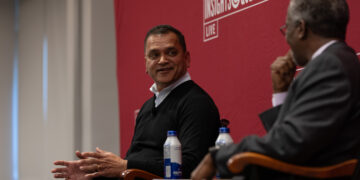This month, Questrom School of Business hosted the panel, “Redirecting Innovation: Can We? Should We?” featuring James Rebitzer, Peter and Deborah Wexler Professor in Markets, Public Policy & Law, Bob Rebitzer, Strategic Healthcare Consultant, and Daron Acemoglu, Institute Professor of Economics at MIT. Moderated by Tim Simcoe, Professor of Strategy and Innovation, the conversation addressed the central question: In an age of many incredible innovations, are these new advances and technologies delivering what they should? And is it possible (or desirable) to shape the direction of technology?

In an era of constant innovation and the growing use of artificial intelligence, healthy innovation systems are complex to navigate. Drawing from their book, Why Not Better and Cheaper? Healthcare and Innovation, the Rebitzer brothers opened the discussion with the claim that healthcare doesn’t get better and cheaper like the cell phones we carry. While the healthcare system often focuses on cost, quality of care, and the ability to access care, the Rebitzer’s introduce a fourth factor – innovations to lower costs for patients and care options while delivering high value. Though there are tools in place, they are not always used as they should be.
The panel touched on the idea that financial incentives don’t always deliver the right direction, and it’s important to motivate people in a competitive environment to do the right thing. According to the panelists, non-financial motivators can fill in these gaps.
The Rebitzer’s and Acemoglu discussed how innovation is often viewed as the solution to most problems, however, this is often a distorted view, as innovation can act as a driver of potential problems. For example, social norms and influential narratives have become increasingly difficult to control, serving as obstacles to innovation.
The panel of experts discussed the factors driving the ever-evolving technology landscape, as well as the opportunities and challenges it brings. Taking into account the ways in which our technologies affect the future is a crucial component of this, as is understanding that powerful actors have a disproportionate effect on the direction of technology.

























